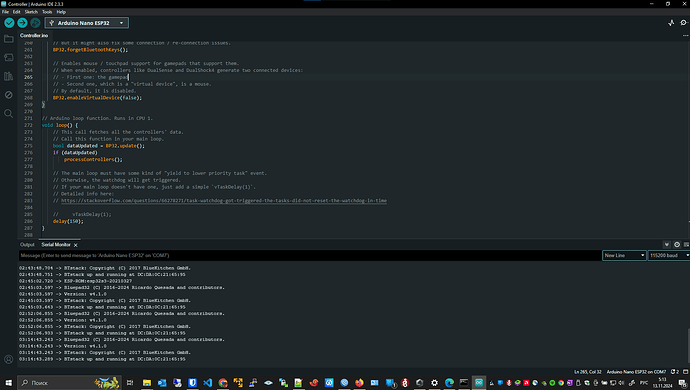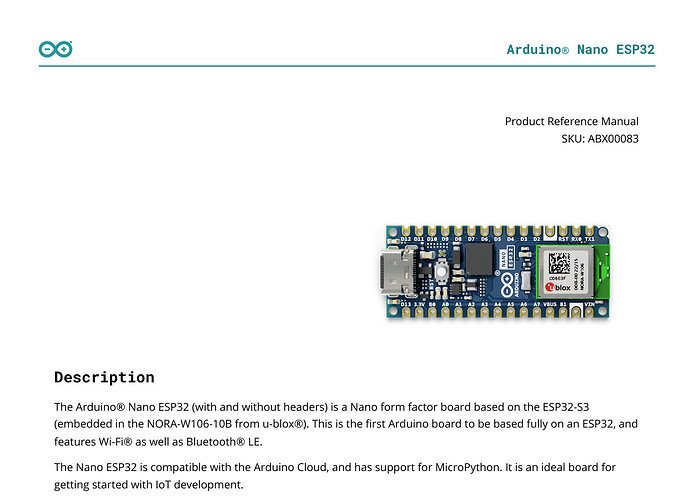Добрый день! Пытаю подключить ПС5 джойстик SONY DualSense к плате, но результата нет, при переключении джойстика в пайр мод, плата никак не реагирует. Помогите пожалуйста решить проблему (скеч при этом ставится без ошибок)
Делал по инструкции Arduino + ESP32 board - Bluepad32
Гит, GitHub - ricardoquesada/esp-idf-arduino-bluepad32-template: ESP-IDF template that has Arduino and Bluepad32 built-in
Использовал esp32_bluepad
Скетчь дефолтный
#include <Bluepad32.h>
ControllerPtr myControllers[BP32_MAX_GAMEPADS];
// This callback gets called any time a new gamepad is connected.
// Up to 4 gamepads can be connected at the same time.
void onConnectedController(ControllerPtr ctl) {
bool foundEmptySlot = false;
for (int i = 0; i < BP32_MAX_GAMEPADS; i++) {
if (myControllers[i] == nullptr) {
Serial.printf("CALLBACK: Controller is connected, index=%d\n", i);
// Additionally, you can get certain gamepad properties like:
// Model, VID, PID, BTAddr, flags, etc.
ControllerProperties properties = ctl->getProperties();
Serial.printf("Controller model: %s, VID=0x%04x, PID=0x%04x\n", ctl->getModelName().c_str(), properties.vendor_id,
properties.product_id);
myControllers[i] = ctl;
foundEmptySlot = true;
break;
}
}
if (!foundEmptySlot) {
Serial.println("CALLBACK: Controller connected, but could not found empty slot");
}
}
void onDisconnectedController(ControllerPtr ctl) {
bool foundController = false;
for (int i = 0; i < BP32_MAX_GAMEPADS; i++) {
if (myControllers[i] == ctl) {
Serial.printf("CALLBACK: Controller disconnected from index=%d\n", i);
myControllers[i] = nullptr;
foundController = true;
break;
}
}
if (!foundController) {
Serial.println("CALLBACK: Controller disconnected, but not found in myControllers");
}
}
void dumpGamepad(ControllerPtr ctl) {
Serial.printf(
"idx=%d, dpad: 0x%02x, buttons: 0x%04x, axis L: %4d, %4d, axis R: %4d, %4d, brake: %4d, throttle: %4d, "
"misc: 0x%02x, gyro x:%6d y:%6d z:%6d, accel x:%6d y:%6d z:%6d\n",
ctl->index(), // Controller Index
ctl->dpad(), // D-pad
ctl->buttons(), // bitmask of pressed buttons
ctl->axisX(), // (-511 - 512) left X Axis
ctl->axisY(), // (-511 - 512) left Y axis
ctl->axisRX(), // (-511 - 512) right X axis
ctl->axisRY(), // (-511 - 512) right Y axis
ctl->brake(), // (0 - 1023): brake button
ctl->throttle(), // (0 - 1023): throttle (AKA gas) button
ctl->miscButtons(), // bitmask of pressed "misc" buttons
ctl->gyroX(), // Gyro X
ctl->gyroY(), // Gyro Y
ctl->gyroZ(), // Gyro Z
ctl->accelX(), // Accelerometer X
ctl->accelY(), // Accelerometer Y
ctl->accelZ() // Accelerometer Z
);
}
void dumpMouse(ControllerPtr ctl) {
Serial.printf("idx=%d, buttons: 0x%04x, scrollWheel=0x%04x, delta X: %4d, delta Y: %4d\n",
ctl->index(), // Controller Index
ctl->buttons(), // bitmask of pressed buttons
ctl->scrollWheel(), // Scroll Wheel
ctl->deltaX(), // (-511 - 512) left X Axis
ctl->deltaY() // (-511 - 512) left Y axis
);
}
void dumpKeyboard(ControllerPtr ctl) {
static const char* key_names[] = {
// clang-format off
// To avoid having too much noise in this file, only a few keys are mapped to strings.
// Starts with "A", which is offset 4.
"A", "B", "C", "D", "E", "F", "G", "H", "I", "J", "K", "L", "M", "N", "O", "P", "Q", "R", "S", "T", "U", "V",
"W", "X", "Y", "Z", "1", "2", "3", "4", "5", "6", "7", "8", "9", "0",
// Special keys
"Enter", "Escape", "Backspace", "Tab", "Spacebar", "Underscore", "Equal", "OpenBracket", "CloseBracket",
"Backslash", "Tilde", "SemiColon", "Quote", "GraveAccent", "Comma", "Dot", "Slash", "CapsLock",
// Function keys
"F1", "F2", "F3", "F4", "F5", "F6", "F7", "F8", "F9", "F10", "F11", "F12",
// Cursors and others
"PrintScreen", "ScrollLock", "Pause", "Insert", "Home", "PageUp", "Delete", "End", "PageDown",
"RightArrow", "LeftArrow", "DownArrow", "UpArrow",
// clang-format on
};
static const char* modifier_names[] = {
// clang-format off
// From 0xe0 to 0xe7
"Left Control", "Left Shift", "Left Alt", "Left Meta",
"Right Control", "Right Shift", "Right Alt", "Right Meta",
// clang-format on
};
Serial.printf("idx=%d, Pressed keys: ", ctl->index());
for (int key = Keyboard_A; key <= Keyboard_UpArrow; key++) {
if (ctl->isKeyPressed(static_cast<KeyboardKey>(key))) {
const char* keyName = key_names[key-4];
Serial.printf("%s,", keyName);
}
}
for (int key = Keyboard_LeftControl; key <= Keyboard_RightMeta; key++) {
if (ctl->isKeyPressed(static_cast<KeyboardKey>(key))) {
const char* keyName = modifier_names[key-0xe0];
Serial.printf("%s,", keyName);
}
}
Console.printf("\n");
}
void dumpBalanceBoard(ControllerPtr ctl) {
Serial.printf("idx=%d, TL=%u, TR=%u, BL=%u, BR=%u, temperature=%d\n",
ctl->index(), // Controller Index
ctl->topLeft(), // top-left scale
ctl->topRight(), // top-right scale
ctl->bottomLeft(), // bottom-left scale
ctl->bottomRight(), // bottom-right scale
ctl->temperature() // temperature: used to adjust the scale value's precision
);
}
void processGamepad(ControllerPtr ctl) {
// There are different ways to query whether a button is pressed.
// By query each button individually:
// a(), b(), x(), y(), l1(), etc...
if (ctl->a()) {
static int colorIdx = 0;
// Some gamepads like DS4 and DualSense support changing the color LED.
// It is possible to change it by calling:
switch (colorIdx % 3) {
case 0:
// Red
ctl->setColorLED(255, 0, 0);
break;
case 1:
// Green
ctl->setColorLED(0, 255, 0);
break;
case 2:
// Blue
ctl->setColorLED(0, 0, 255);
break;
}
colorIdx++;
}
if (ctl->b()) {
// Turn on the 4 LED. Each bit represents one LED.
static int led = 0;
led++;
// Some gamepads like the DS3, DualSense, Nintendo Wii, Nintendo Switch
// support changing the "Player LEDs": those 4 LEDs that usually indicate
// the "gamepad seat".
// It is possible to change them by calling:
ctl->setPlayerLEDs(led & 0x0f);
}
if (ctl->x()) {
// Some gamepads like DS3, DS4, DualSense, Switch, Xbox One S, Stadia support rumble.
// It is possible to set it by calling:
// Some controllers have two motors: "strong motor", "weak motor".
// It is possible to control them independently.
ctl->playDualRumble(0 /* delayedStartMs */, 250 /* durationMs */, 0x80 /* weakMagnitude */,
0x40 /* strongMagnitude */);
}
// Another way to query controller data is by getting the buttons() function.
// See how the different "dump*" functions dump the Controller info.
dumpGamepad(ctl);
}
void processMouse(ControllerPtr ctl) {
// This is just an example.
if (ctl->scrollWheel() > 0) {
// Do Something
} else if (ctl->scrollWheel() < 0) {
// Do something else
}
// See "dumpMouse" for possible things to query.
dumpMouse(ctl);
}
void processKeyboard(ControllerPtr ctl) {
if (!ctl->isAnyKeyPressed())
return;
// This is just an example.
if (ctl->isKeyPressed(Keyboard_A)) {
// Do Something
Serial.println("Key 'A' pressed");
}
// Don't do "else" here.
// Multiple keys can be pressed at the same time.
if (ctl->isKeyPressed(Keyboard_LeftShift)) {
// Do something else
Serial.println("Key 'LEFT SHIFT' pressed");
}
// Don't do "else" here.
// Multiple keys can be pressed at the same time.
if (ctl->isKeyPressed(Keyboard_LeftArrow)) {
// Do something else
Serial.println("Key 'Left Arrow' pressed");
}
// See "dumpKeyboard" for possible things to query.
dumpKeyboard(ctl);
}
void processBalanceBoard(ControllerPtr ctl) {
// This is just an example.
if (ctl->topLeft() > 10000) {
// Do Something
}
// See "dumpBalanceBoard" for possible things to query.
dumpBalanceBoard(ctl);
}
void processControllers() {
for (auto myController : myControllers) {
if (myController && myController->isConnected() && myController->hasData()) {
if (myController->isGamepad()) {
processGamepad(myController);
} else if (myController->isMouse()) {
processMouse(myController);
} else if (myController->isKeyboard()) {
processKeyboard(myController);
} else if (myController->isBalanceBoard()) {
processBalanceBoard(myController);
} else {
Serial.println("Unsupported controller");
}
}
}
}
// Arduino setup function. Runs in CPU 1
void setup() {
Serial.begin(115200);
Serial.printf("Firmware: %s\n", BP32.firmwareVersion());
const uint8_t* addr = BP32.localBdAddress();
Serial.printf("BD Addr: %2X:%2X:%2X:%2X:%2X:%2X\n", addr[0], addr[1], addr[2], addr[3], addr[4], addr[5]);
// Setup the Bluepad32 callbacks
BP32.setup(&onConnectedController, &onDisconnectedController);
// "forgetBluetoothKeys()" should be called when the user performs
// a "device factory reset", or similar.
// Calling "forgetBluetoothKeys" in setup() just as an example.
// Forgetting Bluetooth keys prevents "paired" gamepads to reconnect.
// But it might also fix some connection / re-connection issues.
BP32.forgetBluetoothKeys();
// Enables mouse / touchpad support for gamepads that support them.
// When enabled, controllers like DualSense and DualShock4 generate two connected devices:
// - First one: the gamepad
// - Second one, which is a "virtual device", is a mouse.
// By default, it is disabled.
BP32.enableVirtualDevice(false);
}
// Arduino loop function. Runs in CPU 1.
void loop() {
// This call fetches all the controllers' data.
// Call this function in your main loop.
bool dataUpdated = BP32.update();
if (dataUpdated)
processControllers();
// The main loop must have some kind of "yield to lower priority task" event.
// Otherwise, the watchdog will get triggered.
// If your main loop doesn't have one, just add a simple `vTaskDelay(1)`.
// Detailed info here:
// https://stackoverflow.com/questions/66278271/task-watchdog-got-triggered-the-tasks-did-not-reset-the-watchdog-in-time
// vTaskDelay(1);
delay(150);
}

